Games
The Clairol Beauty Game

This is a game which promotes learning about perms and hair styling.
Source.
Posted By: Paul - Sun Feb 28, 2021 -
Comments (1)
Category: Beauty, Ugliness and Other Aesthetic Issues, Games, Stereotypes and Cliches, 1960s, Hair and Hairstyling
Cefacidal Promotional Playing Cards

Almost the whole set is here.
Posted By: Paul - Wed Feb 24, 2021 -
Comments (0)
Category: Games, Medicine, Advertising, 1970s, South America
Shaver’s Golf
Shaver's golf = a game to find out the smallest number of strokes with which you can shave your face.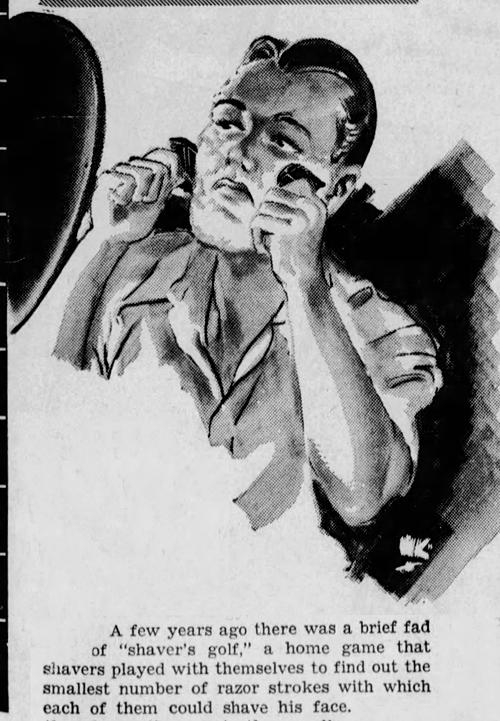
Minneapolis Star - Aug 6, 1939
A useful aid for this game would be the "stroke-counting razor" invented by engineers at Gillette a few years ago. Using this tool, Gillette determined that the average man takes about 170 strokes to shave his face. So, in the game of shaver's golf, I guess that 170 would be considered par.
Posted By: Alex - Tue Jan 12, 2021 -
Comments (4)
Category: Games, Sports, Golf, Hair and Hairstyling
Mary & Gretel
Motto: existence is short and capricious, leavened only by booze.
Posted By: Paul - Wed Dec 16, 2020 -
Comments (1)
Category: Animals, Games, Fantasy, Stop-motion Animation, 1910s, Alcohol
Landslide—the electoral college board game
Kenneth J. Gross and Sebron Koster were granted a patent in 1960 for Landslide, an electoral college board game. Players moved their pieces around the board trying to gain enough electoral college votes to start a 'landslide'. If you want to play it, the rules are below.As far as I can tell, their game was never sold in stores. However, there have been two other board games called Landslide that did make it to market (in 1971 and 2004). Both involved acquiring electoral college votes but were otherwise different than the 1960 version.
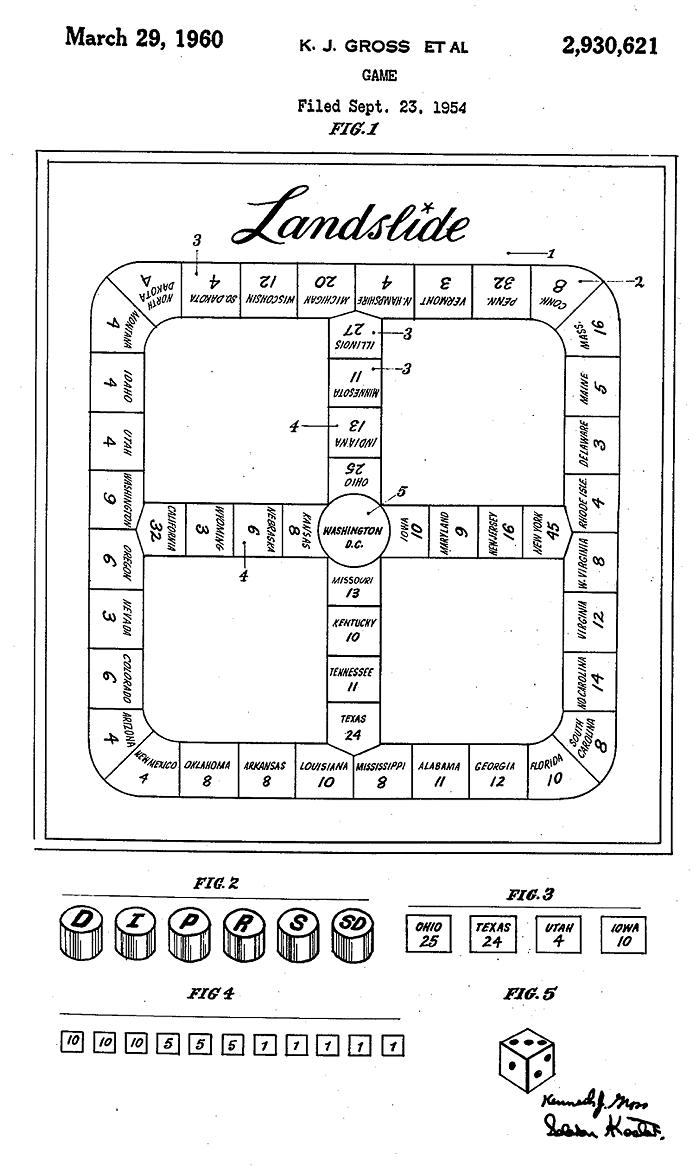
At the start of the play of a game each player selects his political party and takes his marker and tokens to match. Each player or candidate rolls the die and the candidate who rolls high die opens the play. He is succeeded in turn by each candidate in a clockwise direction. All candidates begin their campaign from the central segment, viz. Washington, D.C.
The number appearing on the die indicates the number of segments (States) which the candidate may move his marker and the number of electoral votes he wins in the State attained. He places his marker on that State and beside it his tokens corresponding to the number of votes thereby won in that State.
On each turn a candidate may move in any direction he chooses. The choice of routes allowed to candidates enables them to exert an influence on the development of their campaigns. In passing through a junction of three States he may traverse only two of the States in the course of any one move. He may not reverse his direction of movement in the course of one move. A candidate may not land on nor pass through a State occupied by another candidate's marker. If the movement of a candidate is blocked by the markers of other candidates in such a manner that he cannot move his marker to the full extent of his throw of the die, then he loses that turn. A candidate must move if possible.
A candidate must return to Washington, D.C. at any time that his throw of the die could place him there, providing that Washington, D.C. is unoccupied.
The number of electoral votes of a State won by a candidate is indicated by his tokens placed alongside that State. The entire electoral vote of a State is won by the first candidate to obtain a majority of the electoral votes of that State. When a State is won by a candidate he removes the card of that State and all the electoral vote tokens on that State are returned to their respective candidates.
States that have not been won are indicated by the presence of the State cards still beside them. Any candidate may land on a State that has been won by another candidate irrespective of the presence or absence of electoral votes remaining unacquired.
Whenever a candidate lands on Washington, D.C., he has the right to call a “caucus' if he so desires. When a caucus is declared all candidates count, the electoral votes of the States they have won completely, as indicated by the State cards in their possession. The outstanding electoral votes relating to States not yet won are also counted. Should the candidate with the least number of electoral votes be unable to win the election even by winning all the electoral votes of the States which are not yet won completely then he is eliminated as a presidential candidate. Only one candidate may be eliminated on each caucus.
If on the calling of a caucus, the tally of electoral votes indicates that every candidate still has a chance to win the election assuming his acquisition of all outstanding electoral votes, then the candidate calling the caucus loses all his electoral votes on States not won completely; that is he removes all his electoral vote tokens from the board.
The electoral vote tokens of the eliminated presidential candidate on the States not completely won are removed from the board. The electoral votes of the States completely won by the eliminated candidate are divided among the remaining candidates according to the geographical distribution set out in the table above. In other words the candidate with the most electoral votes from the Eastern States, takes all the Eastern States from the eliminated candidate and similarly for the other geographical groups of States.
The presidential election is won by the first candidate who captures 266 or more electoral votes.
Posted By: Alex - Sun Nov 01, 2020 -
Comments (1)
Category: Games, Politics, Patents, 1960s
Strange Chess Sets
I have a classic SIMPSONS chess set. Perhaps one of these other models might appeal to you.Cats vs. Dogs
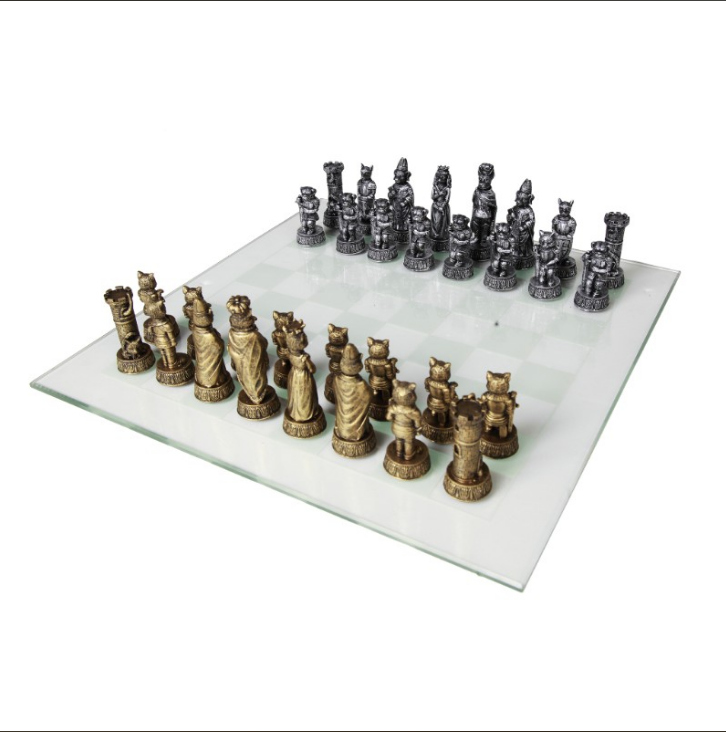
Source.
Architectural

Source.
Baseball
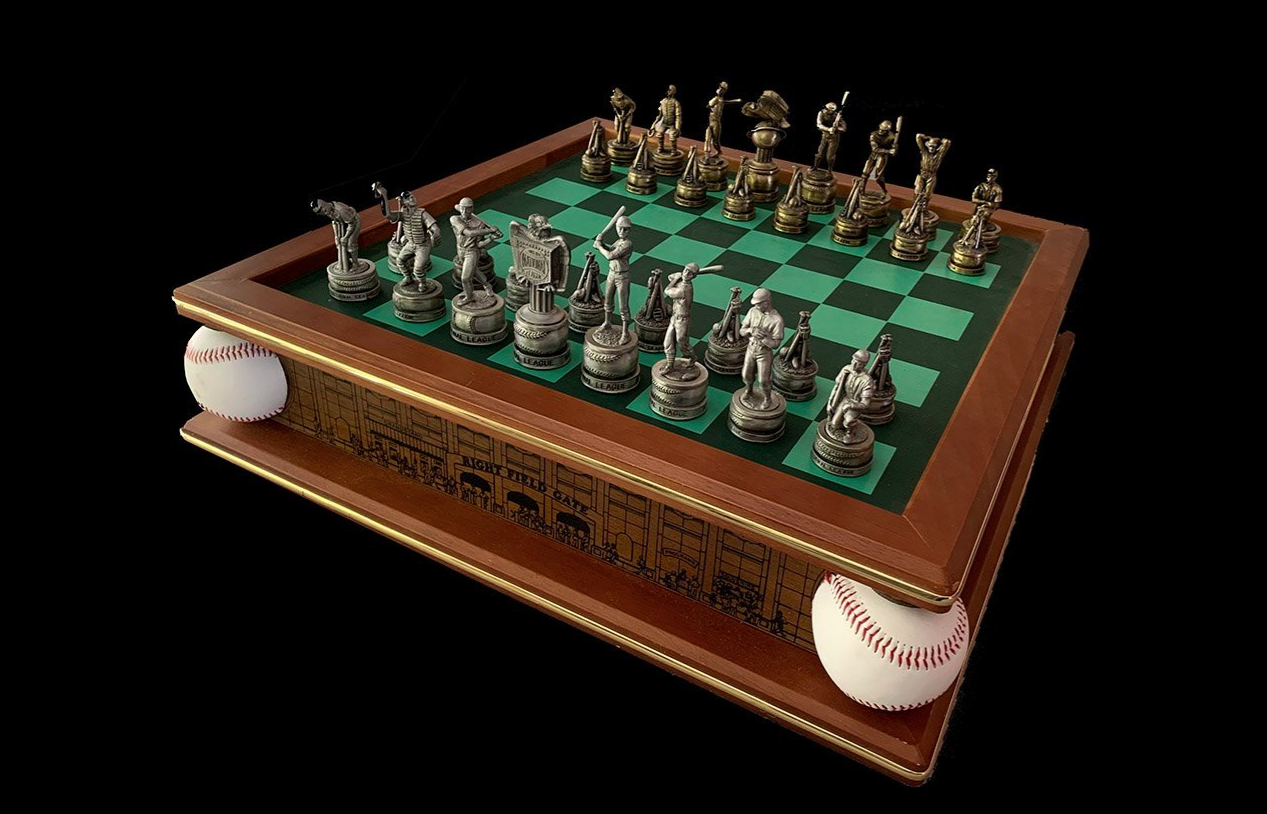
Source.
Napoleon at Waterloo
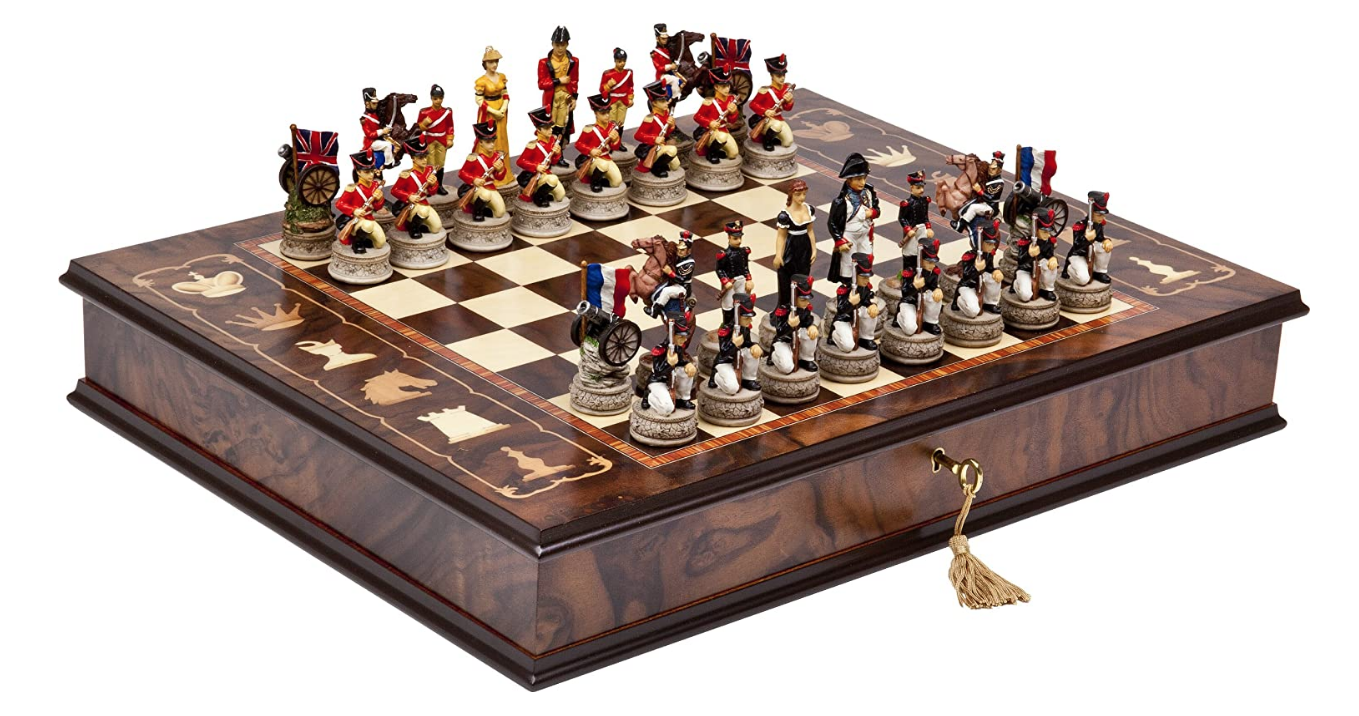
Posted By: Paul - Sun Aug 02, 2020 -
Comments (4)
Category: Excess, Overkill, Hyperbole and Too Much Is Not Enough, Games, Ineptness, Crudity, Talentlessness, Kitsch, and Bad Art
Squatter, the Sheep-Raising Game
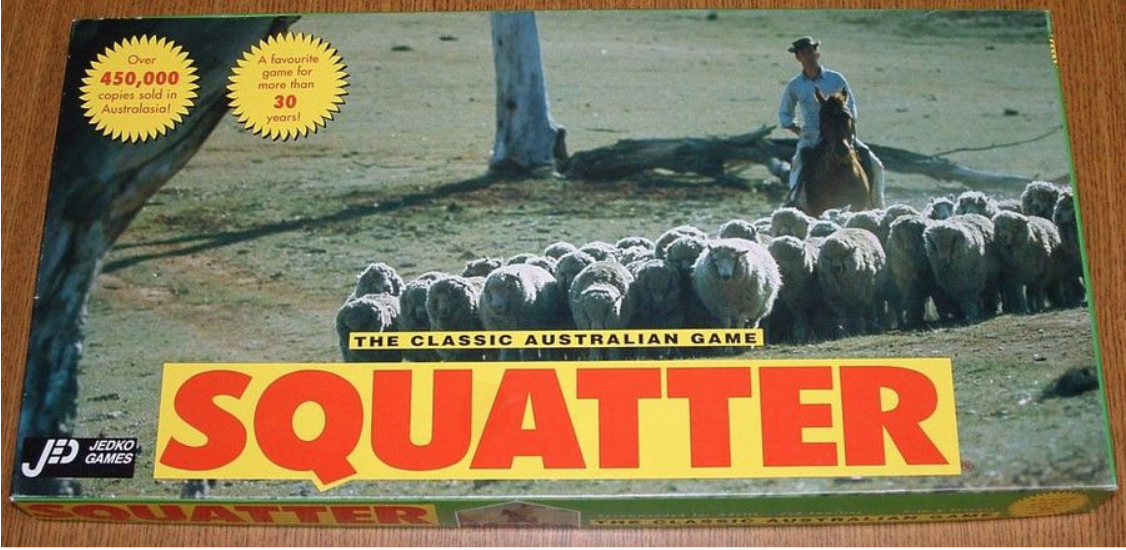
Entry at games database, with pix.
Wikipedia page.
"Some board games turn up the tension so high you practically sweat through your clothes. Squatter, an Australian import which brings home the high-stakes world of sheep-herding, is probably not one of them."
Posted By: Paul - Tue Jul 07, 2020 -
Comments (0)
Category: Animals, Farming, Games, Australia
The War in Cuba Board Game

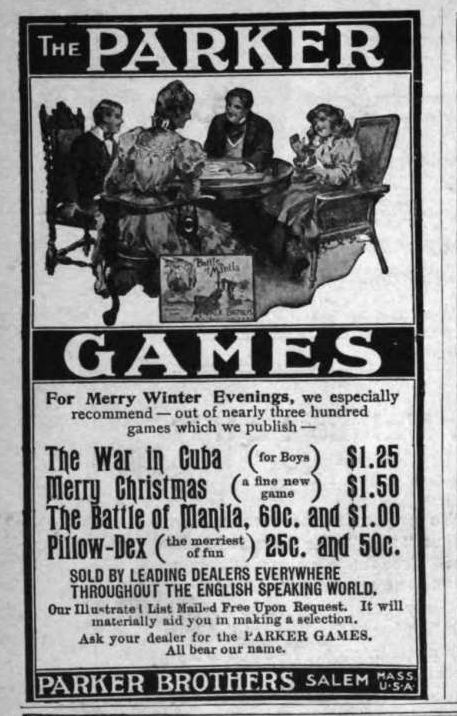
Official entry.
Posted By: Paul - Mon Jun 22, 2020 -
Comments (4)
Category: Games, War, Nineteenth Century
Game Skirts
Source: Life - Oct 19, 1953


Posted By: Alex - Thu Jun 04, 2020 -
Comments (8)
Category: Fashion, Games, 1950s
Get Off The Earth
Created by Samuel Loyd in the 1890s, 'Get off the Earth' became a bestselling puzzle, selling over 10 million copies.There are initially 13 characters, but when the disc moves one of them disappears. How is this possible?
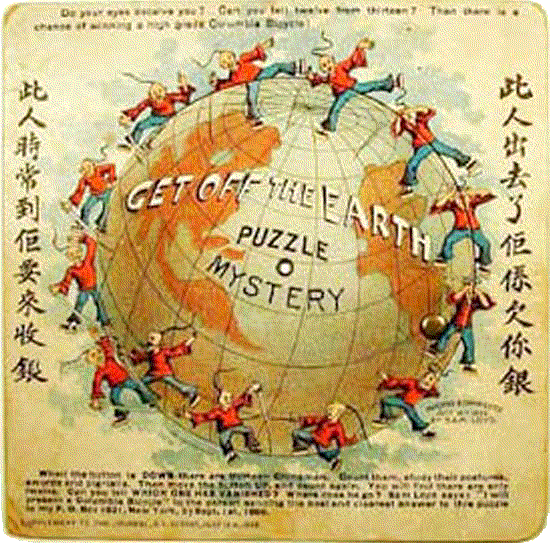
Source: murderous maths
William Poundstone, in Believer magazine, writes:
Posted By: Alex - Sat Feb 22, 2020 -
Comments (2)
Category: Games, Nineteenth Century

| Who We Are |
|---|
| Alex Boese Alex is the creator and curator of the Museum of Hoaxes. He's also the author of various weird, non-fiction, science-themed books such as Elephants on Acid and Psychedelic Apes. Paul Di Filippo Paul has been paid to put weird ideas into fictional form for over thirty years, in his career as a noted science fiction writer. He has recently begun blogging on many curious topics with three fellow writers at The Inferior 4+1. Contact Us |




